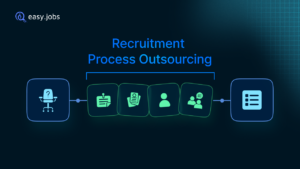Preparing to ace that interview that stands between you and your dream job? You should be preparing your best for Behavioral Interview Questions. If stats are to be believed, it is one of the most common and reliable types of assessments that interviewers take these days. According to many interviewers, how you answer these questions helps them predict how well you will fit in with their organization.
But relax a bit because we have got you covered. To ensure you are well prepared for the interview and any type of behavioral interview questions, we have come up with an entire guide. In this blog, we will help you understand what these critical questions are and what types of answers are expected of you. We have even included a thorough list of queries that you might face, and how you can break down the answers for the best result. So without further ado, let’s dive right in.
Understanding What Are Behavioral Interview Questions
Behavioral interview questions often begin with the phrase ‘Tell me about a time when you…’ – they ask candidates to share real-life scenarios where they have used a certain skill or ability to navigate through the situation. They are usually crafted to solely focus on how well (or, not so well) you are prepared to handle various situations and circumstances in the workplace and to see if you are fit for the position you’ve applied for.
But most importantly, these behavioral interview questions are built in a way that regardless of how you answer, your reply will reveal your basic character traits, abilities, and skills. In simplest words, these queries are generally formatted by presenting a situation to you, then inquiring about what course of action you have taken to respond to something similar in the past, and what the final outcome was. They’re designed to see how you handle stress and pressure while working on a project or with a group of coworkers, as well as how you perform in a professional environment.
Almost every candidate preparing for a job position practices how they will answer the question ‘What is your greatest strength?’. But it’s questions like ‘Can you tell us of a time when you were in a situation where you had to correct a mistake by a senior or a colleague – how did you handle it?’ Because to answer such questions thoughtfully and properly, you really need to have proper work experience and serious capabilities.
What Are Interviewers Looking For With Behavioral Questions?
Now that you understand what are these types of interview questions, let’s dive in further to understand what the hirings are looking for when they ask such them. In most cases, the interviewers are looking for a way to understand if you are as capable as your resume might be saying based on your actual past work performance.
The hiring team wants to learn how you would respond to a specific workplace situation, and how you solve problems to achieve a successful outcome for the organization. And to do so, they ask for examples of your past behavior that will predict future success in the new role. The interviewer is most likely to inquire about how you handled a scenario, and you will need to explain your actions. The logic works like this: your past success is a good indicator of your future success.
However, while these all might seem a bit scary, all your goals in this situation should be to be real and present yourself in the best possible light in front of the questioning team. But more on how to prepare and answer the behavioral Interview questions later in the guide, so stay tuned.
Top 20+ Behavioral Interview Questions That You Might Come Across
Here, we have prepared a list of the top 20 most commonly asked behavioral interview questions. And to make it easier for you to prepare for them, we have categorized them by topic so you know in which direction your answer should lead in order to impress the judges at the interview table.
⏳ Interview Questions About Time management
Time management. Now, this is a category of behavioral questions that you are most definitely about to face when sitting for an interview. The examiners want to learn about your abilities to meet deadlines sophisticatedly and to gain an understanding of how you handle multiple responsibilities, multi-task, and prioritize time. But most importantly, they are looking to understand if your organizational skills are the right fit for the job position.
1. Tell us about a goal you had set for yourself in your previous job or college, and how have you ensured that you achieve it.
2. Tell us about the time your responsibilities got a little overwhelming and your workday ended before you were able to get everything done. What did you do?
3. Give us an example of a time you had multiple responsibilities piling up on your shoulders and had to prioritize certain tasks over others, and yet managed to finish before the deadline.
4. Describe a long-term project that you kept on track. How did you keep everything moving?
5. Tell me about a time an unexpected problem derailed your planning. How did you recover?
⭐ Queries That Questions Your Adaptability
When hiring new employees to the team, interviewers will definitely want to know if you are capable of adapting to new work situations, team members, etc. So, you need to prepare for questions that will test your ability to adjust your approaches however needed in order to achieve success and growth.
1. How Would You React To Ideas Or Approaches If They Differ From Yours?
2. Give me an example of a time when you had to think on your feet and make a split-second decision. What was your thought process?
3. Tell me about a time your plans had failed – whether in the last office, your university, or simply at that party you were arranging. How did you deal with the situation?
4. Can you share about a time you had to be flexible or adaptable in a work situation because your team members had a different approach?
5. Tell me about a time you had to learn quickly and make a difficult decision.
🤝 Behavioral Questions About Teamwork & Communication
Almost any job requires you to work directly or indirectly with others, whether it be teammates or external teams. So being able to effectively interact and communicate with others is a skill that interviewers will definitely be looking for when asking your behavioral interview questions. So be prepared to talk about your experiences as part of a team.
1. Tell me about a time when you had to work closely with a team member whose personality was very different from yours.
2. Give me an example of a time you faced a conflict with a coworker. How did you handle that and could you persuade him/her to see things your way? Or, do you wish you could have handled the situation differently?
3. Describe a time when you had to step up and demonstrate leadership skills.
4. Share an example of how you were able to motivate a coworker, your peers, or your team.
5. Tell me about a time when you had to explain a complex topic to people with less subject knowledge. How did you make sure everyone understood you?
🚨 Questions About Motivation & Overcoming Challenges
As you can already tell from the categories above, employers ask questions about overcoming a challenging situation to gauge your level of perseverance, patience, and adaptability. Asking questions about your values and what motivates you allows employers to gain insight into how you stay focused and the limit you are willing to go to in order to bring success to the company. Your answers will help employers determine if you’re a good match with the company’s mission and style of work.
1. Tell me about a time when you made a mistake or a goal you almost failed to achieve. Did you manage to turn that situation around?
2. Tell me about the proudest moment in your professional career why it was a meaningful accomplishment for you.
3. Tell us about a time you had to take an initiative and get your entire team on board.
4. How do you stay motivated when a job requires you to perform repetitive tasks?
5. Tell me about a time when you were in conflict with a peer and how the situation was resolved. Or, do you wish you had handled a situation differently?
6. What do you do when a team member drops the ball and doesn’t complete their work?
7. Describe a time when your work was criticized and how you handled it.
Tips On How To Prepare For Behavioral Interview Questions
There is no right or wrong answer to any of these interview questions designed to analyze your behavior or critical thinking abilities as mentioned above and can vary significantly from candidate to candidate. The more creative and thought-out the response is, the better your chances are at getting selected as the newest hire for the organization.
Try to highlight the following traits about yourself when answering the questions based on behavior and critical thinking during an interview:
⭐ Self-awareness
⭐ Growth
⭐ Self-reliance
⭐ A willingness to help another individual
Here are some helpful tips that you can use to prepare for the interview:
Prepare examples & stories ahead of time: While you may be asked a few uncommon questions, if you have read this blog completely by now you must have an idea of how these behavioral-based questions are asked. To fully prepare for whatever question for might face it’s helpful to think of some scenarios and examples in advance and practice your responses. Your answers should provide a brief story that illustrates your skills and strengths.
Take your time answering: Since most of these questions will be asked in real-time during the interview session, make sure to stay calm and give yourself a moment to think of an appropriate answer. Tell your story, and how the situation progressed and end with a positive conclusion that shines a bright light on you.
Follow the STAR technique to form your answers: The best way to reply to any behavioral interview question is to use the STAR technique, which is an abbreviated term that stands for situation, task, action, and result. It’s important to keep your answer concise and relevant to the question.
What Is The STAR Technique For Answering Interview Questions?
The STAR technique is a four-step helpful strategy for responding to job interview questions with organized replies that are sure to land the job for you. As mentioned above the 4 steps of this process are:
⭐ Situation: Describe your position in the project or situation briefly. Share enough context and relevant details so that the interviewers can visualize clearly the scenario.
⭐ Task: Then describe or explain the task that you can accomplish for the project.
⭐ Action: Briefly talk about the actions you had to take to complete the tasks and meet the deadline (if any). Make sure to keep the focus on your work, your team spirit, and your skills.
⭐ Result: Finally, make sure to conclude your story by describing the outcome of your actions and achievements. And if possible, mention how your actions have led to the betterment of the organization or company you were a part of.
Ace Any Job Interviews By Preparing For Any Type Of Questions
And with that, we want to conclude our list of Behavioral Interview Questions that you might face when job hunting, or our guide on how to prepare for the queries. However, if you want to take your preparation to the next level, you should also check out our blog on ‘Top 10 Critical Thinking Interview Questions’ that interviewers might ask you. The guide will not only tell you the questions to look out for but also help you understand what type of answers a company might want. Or, you can check out our list of the top icebreaker questions to get your team together.
If you find this blog helpful and helps you land your dream job do let us know in the comments below. For more tips on recruitment and hiring, make sure to subscribe to our blog or join our friendly Facebook community to get all the latest updates.











